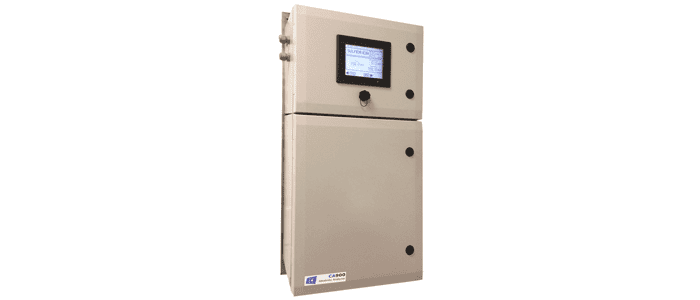Accurate Sulfide Measurement Helps Optimize Oil/Gas Production and Refining Processes
Anaheim, CA—July 25, 2023—Oil and gas engineers tasked with accurately measuring hydrogen sulfide (H2S) levels in both production and refining operations will want to know more about the all-in-one CA900 Sulfide Analyzer from Electro-Chemical Devices (ECD).
The ECD CA900 Sulfide Analyzer is an all in one analyzer for the continuous measurement of sulfide ions in aqueous media, which are typically encountered at drilling production sites and in refinery operations, as well as in chemical plants. Other applications include municipal drinking water and wastewater effluent treatment, pulp/paper plants and tanneries.
Featuring minimal reagent consumption, the CA900 Sulfide Analyzer requires less than two gallons per month providing two samples per hour, or lasting five months at two samples per hour. Users save on reagent cost and disposal fees while also minimizing technician labor time.
Hydrogen sulfide gas dissolves in water and gives it that “rotten egg” odor. It exists in acidic water as a dissolved gas, at values above pH 7. Bisulfide ions (HS) are the predominant form of sulfide and are only present at very high pH values (above pH 13), which is where sulfide ions (S-2) are present and measurable.
The ECD CA900 uses an advanced, reliable sulfide ion selective electrode (ISE) sensing technology to measure the total amount of sulfide present in the sample. This measurement must be made at the high pH levels where S-2 is present. In order to achieve this high level of S-2, potassium .hydroxide (KOH) is added to raise the sample level to around pH 13 (a pH electrode measures the actual pH level).
Sulfide and bisulfide co-exist in a pH dependent equilibrium with the ratio of each dependent on the pH. The sulfide ISE sensor measures the sulfide present in the sample and the pH measurement infers what percentage of the total sulfide is present. The analyzer then calculates and displays the total sulfide present.
The highly caustic sample is then neutralized with HCl, and the pH is measured and displayed to verify the neutralization. The neutralization of KOH is accomplished with HCl and produces potassium chloride (KCl) salt and water. The neutralized sample can be disposed of as waste or returned to the water supply.
ECD’s CA900 S-2 Analyzer measures S-2 over a wide range from: 0.02 to 500 mg/l (0.02 to 500 ppm) over a temperature range of 20 to1 20°F (-5 to 50°C). The sample cycle rate is user changeable with a minimum cycle rate of 6 minutes per cycle time. The analyzer’s full-featured design also comes with four 4-20 analog outputs and four configurable relays (SPDT 15A 250VAC).
The CA900 S-2 Analyzer is easy to start up and maintain. First connect the sample feed line, reagent lines and drain line to the analyzer. Mount the S-2 and pH sensors in the flow cell. Next connect the two outputs (S-2 and pH) and supply power, a switched 110/220 VAC line. Prime the peristaltic pumps and start the measurement cycle.
With a touch screen display and 4-20 mA outputs, the S-2 Analyzer will indicate the total sulfide and the neutralized pH value. A digital display indicates the S-2 measurement and the 4-20 mA output values are captured in the measurement cycle and displayed until the next measurement cycle
Accessing information or customizing analysis routines are both easily accomplished with the CA900 Analyzer’s user-friendly menu structure and touchscreen interface. The analyzer also can be web-enabled as a powerful internet of things (IoT) tool for remote in-plant monitoring and interfacing with personal handheld devices such as controllers, mobile phones, tablets, laptops and computers.



